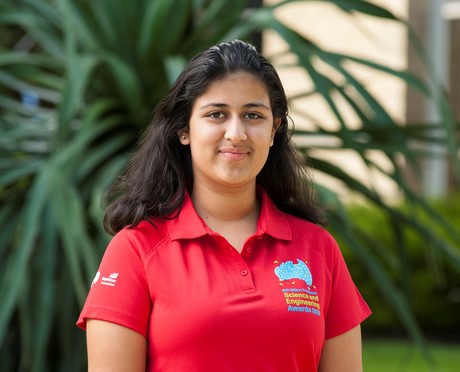Prawn-based bioplastic heads to international science fair

Australian high school student Angelina Arora is set to represent her country at the Intel International Science and Engineering Fair (Intel ISEF) — the world’s largest international pre-college science competition — in Pittsburgh, Pennsylvania, where she will showcase her award-winning ‘shrimp bioplastic’ solution.
Arora first became interested in bioplastics after being asked to pay for a plastic bag at a shop, which prompted her to think of a way people could still have the convenience of plastic without the harmful environmental effects. After becoming a finalist in the 2017 BHP Billiton Foundation Science and Engineering Awards for her research into the commercial viability of bioplastics, she decided to refine her research, working with a CSIRO mentor to develop a completely biodegradable plastic made from prawn shell and sticky protein from the silk of silkworms.
“It was amazing after months of research that I found a plastic that was suitable,” Arora said, having successfully tested the strength, elongation, clarity, solubility, deconstruction and endurance of her product as well as other plastics made out of potato, corn and tapioca.
It was this research that won Arora the Innovator to Market Award in the 2018 BHP Billiton Foundation Science and Engineering Awards. Now she and her fellow finalists are heading to Intel ISEF as part of the BHP Billiton Foundation Science and Engineering Awards Australian delegation, where they will showcase their projects alongside 1800 other high school students from 75 countries, regions and territories. Participants at the science fair, which is running from 13–18 May, will be competing for what amounts to around $4 million in prizes.
CSIRO Education and Outreach Director Mary Mulcahy said showcasing Australia’s brilliant science, technology, engineering and mathematics projects on the world stage is a key part in enabling Australia to adapt for a rapidly changing future.
“The world is changing faster than many of us can keep up with, but science, technology, engineering and maths (STEM) can guide that future through innovation,” Mulcahy said.
“These students are showing on a world stage that Australian students are prepared more than ever for the future.”
Berrima Cement Works upgrades with sustainable tech
Boral has unveiled new carbon-reducing technology at the site, which supplies 40% of cement in...
Australian orgs partner to speed circular economy
GS1 Australia has joined forces with the Product Stewardship Centre of Excellence to drive the...
Victorian utility recognised at Asian Water Awards
South East Water won two awards for its Hydrotrak Geofencing technology, which has helped it to...









